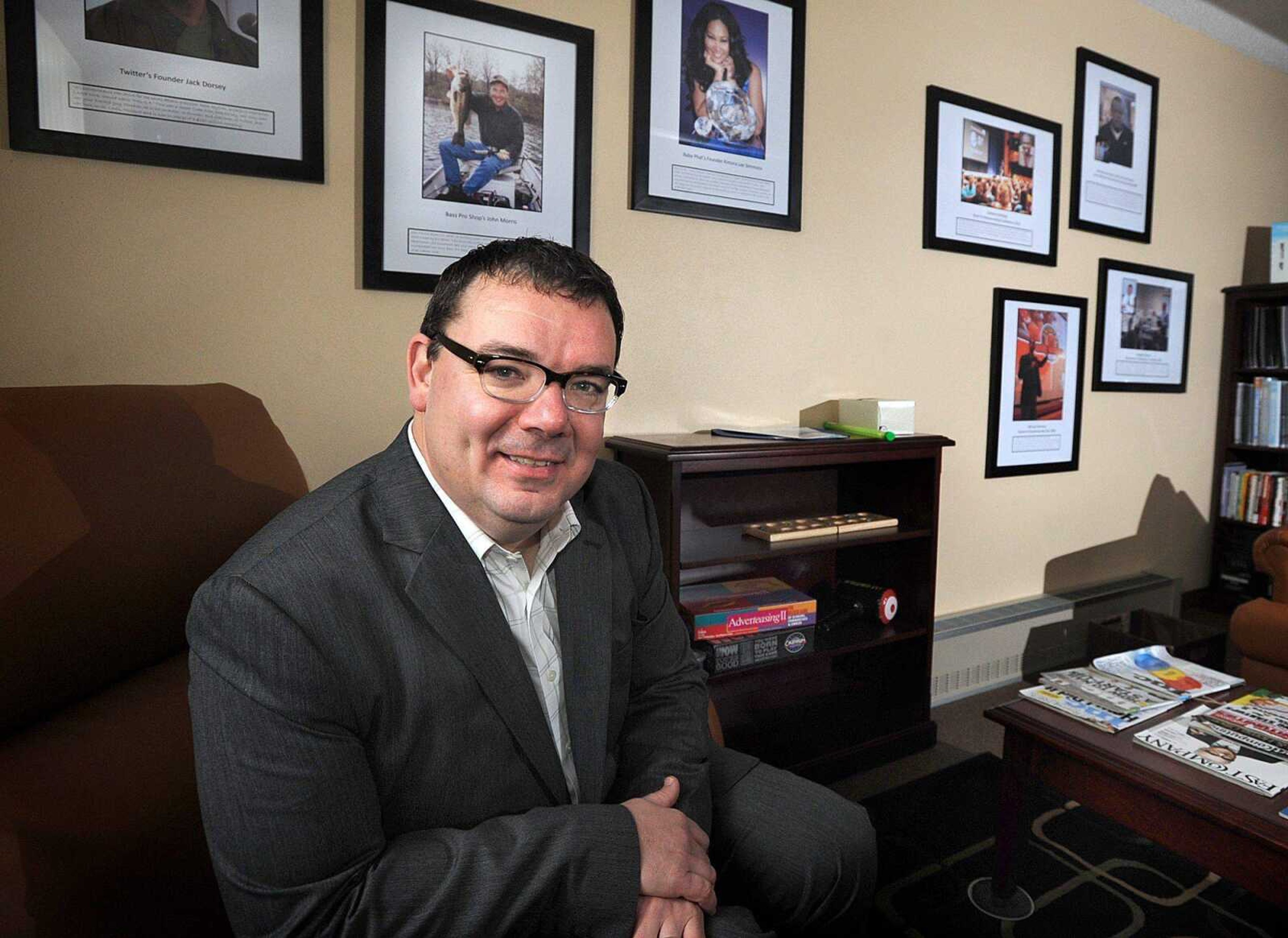Talking Shop with Dr. James Stapleton of the Douglas C. Greene Center for Innovation and Entrepreneurship
Dr. James Stapleton is executive director of the Douglas C. Greene Center for Innovation and Entrepreneurship and associate professor of management at Southeast Missouri State University. He researches business dynamics, including the factors associated with job creation, rural innovation and entrepreneurial development. He sat down with the Southeast Missourian to talk about how local communities can encourage a healthy "entrepreneurial ecosystem."...
Dr. James Stapleton is executive director of the Douglas C. Greene Center for Innovation and Entrepreneurship and associate professor of management at Southeast Missouri State University. He researches business dynamics, including the factors associated with job creation, rural innovation and entrepreneurial development. He sat down with the Southeast Missourian to talk about how local communities can encourage a healthy "entrepreneurial ecosystem."
Q: What is the entrepreneurial ecosystem?
A: I think about it like you would a natural ecosystem, in that it's a system that has component parts that work together to create ... an end. Sort of like we think about infrastructure; if you don't have clean water and bridges and roads and that sort of thing, then life is difficult. If we have that infrastructure then it leads to a better possibility that people have better quality of life. It's easier to get places, get the things you need. In the same way that we have created that, over the years, traditional economic development infrastructures -- business parks, industrial parks, workforce development agencies that make sure people get the training they need, etc. -- all those things are sort of a pipeline ... When there is an opportunity to attract an employer, then the infrastructure is in place. I am suggesting and advocate for a similar approach for entrepreneurship.
Q: Where do small businesses fit into that?
A: Not all small-business owners are entrepreneurial. Some people own a business to sort of generate a lifestyle that they want. They choose self-employment over employment but approach it the same. The business is just a job. Instead of going to the business and thinking every day about how to grow the business and become more and more innovative and expand into other markets ... as long as the business provides employment and the things that the other job would have provided, [owners think] "I'm all set." The data indicates that the largest share of small-business owners are in that vein. And then there is a smaller subset of small-business owners and business folks that are really entrepreneurial. [They] have a greater impact on job creation.
The two combined ... based on some research that we began doing about a year ago actually are responsible for 91 percent of net new jobs created in our region. The businesses that are creating job over time are small local businesses. We're talking about nine or fewer employees.
Q: How are jobs created and sustained?
A: There are three way jobs are created: the starting of a new business, the expansion of an existing business or the attraction of a business. Obviously, the opposite happens in each of those three cases that ends up eliminating jobs: the closing of a business, the contraction of a business and the moving out or the relocation of a business.
Long-term ... the two dynamics that create most of the churn in jobs, we refer to it as, are starting and closing and expanding and contracting. Small businesses, those very small businesses expanding, are responsible for most net job creation, long-term.
One of the alarming things in the data is that we, in our region and in other rural regions that we study, since the 2001 recession, [have had] a dramatic decline in entrepreneurial activity. It's one of the reasons I advocate for, given the impact it has on jobs, creating systems that will lead to more activity, that will incentivize activity that either is targeted at small-business expansion or new business creation.
Q: Is there something specific to this region about that dynamic?
A: Rural regions seem to be really losing the battle since that 2001 recession and really never recovered. If you look at the data, the country overall sort of got back to where it started in 2005. Rural regions never even got close. I'm talking about employment, the number of jobs. Then, a couple of years later we get hit with the '07 mess and so now we have what is recorded as fairly low, moderately low, unemployment, but as we all know living here ... a lot of people are not only unemployed, but quit looking and are not even included in the data that's reported. And secondly, folks are underemployed. If you look at wages, people have been stuck for a long time.
Q: What makes it more difficult for rural areas?
A: It's a couple of things. There's sort of two ways to look at this, the supply side and the demand side. On the supply side, we've seen a real challenge with access to capital. If you talk to small-business people, either existing business owners or people trying to start a business, they will tell you they struggle finding capital. [In urban areas] there are more alternatives to traditional bank financing, [whereas] we have very few alternatives.
Q: What resources do other rural areas lack?
A: In term of financing, you are seeing a real emergence in alternative forms of financing. And some of them are really geared toward early-stage, startup-kind of activities, like microlending. It's been working really well for 10, 12 years in urban areas. You also see asset-credit building kinds of activities, that lead to individuals being more bankable, so they can tap into traditional bank financing.
The other side of it is the funding side, which is access to angel or venture capital. We have very little of that formalized activity going on in our region and in most regions. You see people pretty much dependent on banks.
That leads to a discussion of the other side, the demand side. There are a fewer number of really successful entrepreneurs at a large-enough level. Those are the kind of folks that typically pass on their knowledge and skill set, that kind of mentoring that goes on. We end up with a lot of entrepreneurs or aspiring entrepreneurs in rural regions that don't have a lot of the training and expertise and experience they need and not a really well-developed network to rely on to coach them through the challenges. That ... increases the risk of starting a new business.
Q: What trends can people expect to see, looking forward?
A: I would just choose a couple. There are huge demographic changes going on, so obviously we are seeing what we refer to as the "she-economy." It's expected that 870 million women will come into the employment market by 2020, in the world. We're starting to see in the United States ... an increase in opportunities for female entrepreneurs and business folks. We're seeing diversity in terms of ethnic, racial diversity, sort of the "browning" of the business community, as well. The other big one is the Baby Boom generation entering into retirement. And Generation Z, it's being called, the ones that are following Millennials, that are teenagers soon. It's the first generation that has grown up with both mobile and social technology.
The Bureau of Labor Statistics estimates, by 2020, we'll have to fill 56 million jobs in the country. Some people think we'll be at least 10 million to 12 million short. And all of those 10 to 12 million will be in specific, technical and highly educated jobs, for the most part. The good news is, unemployment should be less of a problem. The bad news is, will people have the right skill sets for the jobs? And, from a small-business standpoint, what that means is, you are going to have to really compete more and pay more for talent.
Q: What can people in the community do to support the health of the entrepreneurial ecosystem?
A: Especially in the economic development world ... oftentimes the conversation morphs into a sort of dichotomy. "Well, we're either going to do traditional economic development or we're going to do entrepreneurial development," which is a silly notion. One belongs inside the other -- they have to work together. Communities need to make possible, to the extent that they can, both the attraction of businesses who might want to take advantage of the qualities of the community and individuals who might want to start and expand small businesses. The kinds of things we've put into place to try to attract companies ... we have to do that on this entrepreneurial development side. We've developed a policy framework that I wrote for the Delta Regional Authority that ... deals with five major elements. They deal with everything from creating a pipeline of skilled entrepreneurs which starts, in my view, in elementary school, when you start talking about careers and helping young people understand that being self-employed or employing others is a career choice. All the way to looking at local regulatory and licensing issues ... to make it, again, just more possible, easier for people who want to start businesses to start them. And, of course, you'll see the elements of capital and some discussion about innovation and technology, which is a real challenge for rural regions. And the types of education and training that we do here [at the CIE], too.
We're actually having a discussion locally with leaders about doing a community assessment about ... where we are with the ecosystem here in Cape Girardeau and what we can do to create Cape Girardeau as the hub for entrepreneurship regionally. We're a hub for lots of other things. We ought to be thinking about what we can do to make sure we're the regional hub for entrepreneurship. One of the things we are going to have to consider is incentives. Communities are always happy to and interested in investing, along with state and other resources, considerable amounts of funding and incentives for larger employers. Our research actually indicates those are probably pretty healthy short-term investments, but over the long term, those jobs tend to leave with the company when it leaves. So you see that these attraction strategies, they are very attractive, I think especially within election cycles, but, over a longer period of time, when times get tough or the dynamics and the marketplace of that particular firm changes, then they are going to pack their stuff and leave town. The only net job growth in the last 20 years in our region has been locally-owned companies.
What can individuals do to create the healthiest local economic environment?
Individuals need to think about where they spend their money. I always think the greatest voice most of us have is the vote we make when we choose to commercially trade with someone.
salderman@semissourian.com
388-3646
Pertinent address:
920 Broadway, Cape Girardeau, Mo.
Connect with the Southeast Missourian Newsroom:
For corrections to this story or other insights for the editor, click here. To submit a letter to the editor, click here. To learn about the Southeast Missourian’s AI Policy, click here.











